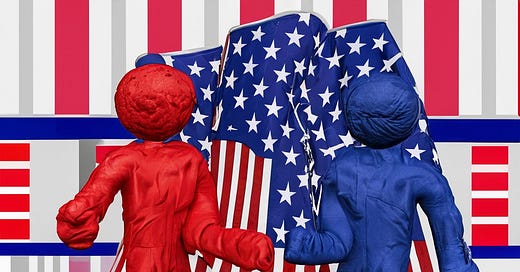Daily Grind - How we measure racism
And the impact that has on progressive interpretations of politics
I’ve mentioned before that anyone looking to advance progressive political goals would do well to read The Liberal Patriot here on Substack.
In a recent post, Ruy Teixeira dives into a debate that has been ongoing in progressive circles since Trump won in 2016: Was the primary driver of Trump’s success due to economic grievances or racial grievances among his voters?
For my part, I leaned toward (even wished for) an economic explanation. Being a child of the Rust Belt, I often thought Trump sounded a great deal like Democratic politicians of the past: pro-working class, anti-foreign competition (and by extension at times, “foreigners”), and with a bombastic, in-your-face attitude that doesn’t fit well in elite circles. (Think Jim Traficant - who also ended up in legal trouble, by the way.) I found myself not always disagreeing with his policies (if, as was proven true, his character makes him completely unsuitable to hold elected office in the U.S. ever again). In the end, it didn’t come as an enormous shock that he won at the margins in the Midwest.
However, over time, I kept hearing many progressive sources and thought leaders state, unequivocally, that the economic explanation was bunk and that the only explanation was the rank racism of Trump voters.
It never occurred to me to dig into exactly how all of these progressive social scientists and political analysts were determining the singular power of racial animus. And by how I mean exactly what questions they ask in surveys to figure this out.
From the Teixeira piece, I first learned about the “racial resentment scale”. It’s a series of questions that are commonly accepted in social scientific polling designed to tease out latent racism. From Wikipedia, here they are:
The standard racial resentment scale is a list of four statements, with respondents indicating how strongly they agree or disagree with each one:[1]
Irish, Italian, and Jewish ethnicities overcame prejudice and worked their way up. Blacks should do the same without any special favors.
Generations of slavery and discrimination have created conditions that make it difficult for blacks to work their way out of the lower class.
Over the past few years, blacks have gotten less than they deserve.
It's really a matter of some people just not trying hard enough: if blacks would only try harder they could be just as well off as whites.
Okay, hang on a second. That first question strikes me as being as much a measure of traditional American work values and their connection to merit and reward as they do about race. More from Teixeira, referring to the first question specifically:
The variable is widely and uncritically employed by political scientists to indicate racial animus despite the obvious problem that statements such as these correspond closely to a generic conservative view of avenues to social mobility. And indeed political scientists Riley Carney and Ryan Enos have shown that responses to questions like these change very little if you substitute “Nepalese” or “Lithuanians” for blacks.
So, in fact, the questions used to “prove” the racism of Trump voters might instead just be activating “conversative” values - values I largely share (never forgetting the role of luck), while still being able to see how particular racial disadvantages make living up to these values that much harder.
For example, I’ve always been disappointed by studies that show that people who don’t have traditional “white” names often get ignored for job openings. Advocates who still favor the ideal of a colorblind society, like myself, have to face these sorts of realities head-on.
That said, perhaps we shouldn’t be so quick to accept racism as the explanation for all of Trump’s rise. It can only serve to distort our perception of political realities and help pave the way for a racialized, balkanized politics that damages our nation or our citizens.
For a somewhat but not entirely different take on the racial resentment scale, read this piece from The American Prospect by Jamelle Bouie. The piece is more than 10 years old (he’s now at the New York Times), which leads me to wonder if his take has changed at all.
Anyway, he writes that the racial resentment scale could indeed just be revealing a preference for “traditional American views on hard work and individualism”. However, he argues that racism still comes into play when people judge who actually possesses those personal virtues of hard work, etc., and, by extension, who deserves the benefit of the economic doubt.
He connects this to views on traditional “welfare” programs (my scare quotes). The argument is that, in general, if a program will benefit blacks primarily, even if not directly targeted in that way, it faces a more difficult political road because whites will see the program as a handout, not a hand up. Read his entire piece.



